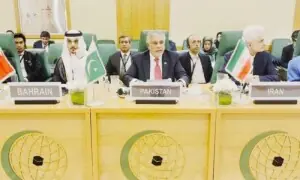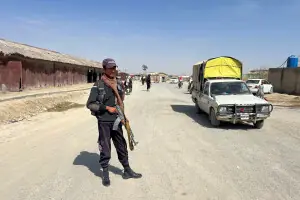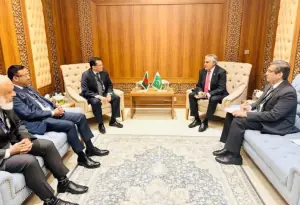UAE rejects 'unfair' OPEC+ output deal
3 min readDUBAI: The United Arab Emirates on Sunday criticised the current oil production deal among OPEC+ alliance members as "unfair", offering to extend the agreement only if its production is reviewed.
In a row that could put at risk the energy market's post-coronavirus recovery, the UAE's push to increase its production baseline is reported to have derailed last week's meeting of the alliance of oil-producing countries.
The current deal "would prolong the UAE's unfair reference production baseline until December 2022, from the existing agreement end date of April 2022", the energy and infrastructure ministry said, quoted by state news agency WAM.
The UAE, with its heavy investment in expanding capacity, is "willing to extend the agreement further, if required, but requests that baseline production references be reviewed to ensure that they are fair to all parties as/when an extension is agreed to", it said.
Videoconference talks were held Friday between the 13 members of OPEC proper led by Saudi Arabia, followed by a technical meeting and discussions between the 23 members of OPEC+.
The wider grouping includes Russia, the world's second-largest oil producer.
The hitch in discussions came "due to the UAE raising a last-minute objection to the Russian-Saudi Arabia deal reached earlier", according to analysts from Deutsche Bank.
"The UAE, which has raised its production capacity since 2018 when the individual baselines were set, insisted on having its baseline lifted by 0.6 million barrels per day (bpd) to 3.8 million bpd, thereby allowing them a unilateral production increase within the current quota framework," according to Ole Hansen from Saxobank.
"Negotiations... will be difficult as OPEC+ knows that if the UAE is allowed to produce from a different base, other members may protest," said Louise Dickson from Rystad.
OPEC said the meeting had been adjourned and would reconvene on Monday at the cartel's Vienna headquarters.
**- Angst over high prices -**
Bloomberg news agency reported Thursday an agreement had been floated that would raise production by 400,000 barrels per day (bpd) each month from August onwards, reaching an extra two million bpd by the end of 2021.
This would fit the broad strategy followed by OPEC+ since May: gradually increasing output which it had drastically cut in reaction to the collapse in demand at the beginning of the coronavirus pandemic.
Since the beginning of the economic crisis, the group has held almost monthly meetings to coordinate their response.
Their strategy has succeeded in steering prices back upwards -- they are now at levels not seen since October 2018.
The alliance has to navigate a complex market, characterised by an uptick in demand which may yet turn out to be fragile, as well as the possible complication of a return of more Iranian exports in the medium term.
In addition, current high prices are prompting grumbles from large crude consumers, such as India.
Abu Dhabi's muscular position is also pitting it against its long-time ally and neighbour Saudi Arabia, the world's largest oil exporter.
The UAE reportedly floated the idea of leaving OPEC+ in late 2020, in order to pump more oil and capitalise on the hugh investment it has made to expand capacity.
For the latest news, follow us on Twitter @Aaj_Urdu. We are also on Facebook, Instagram and YouTube.





















Comments are closed on this story.